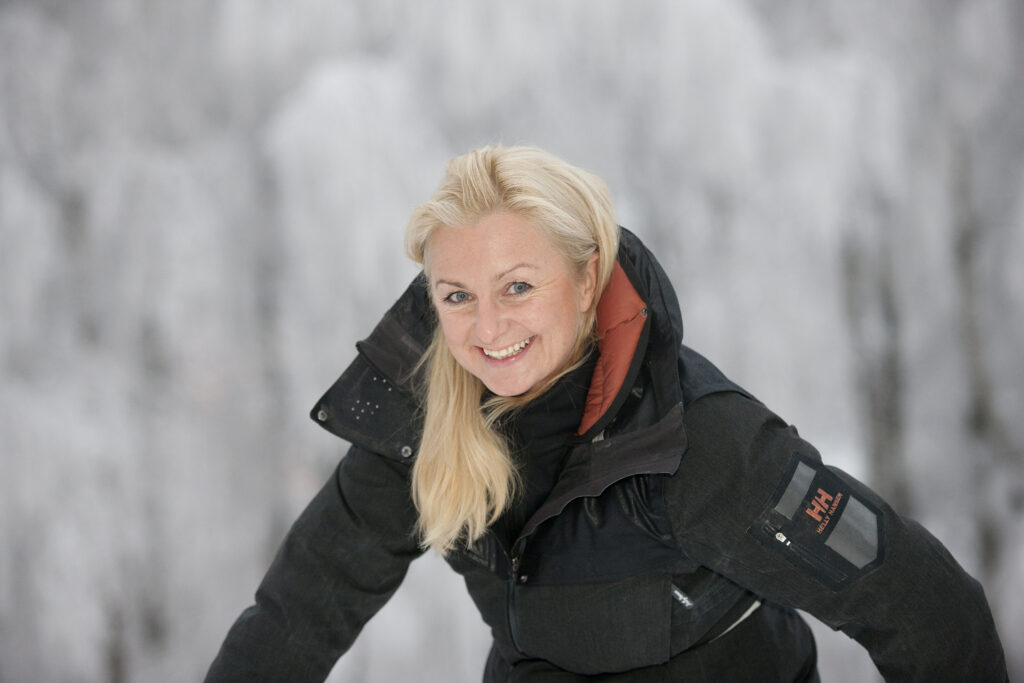
Ann Christin Andersen worked in the oil and gas industry for the best part of three decades. But a desire to spend less time on airplanes and more time in her home country led her to switch careers and move onto a greener path.
“My parents were getting older, and I wanted to be available for them. I had approval from TechnipFMC to live and work from Norway for a couple of years. But in 2019, the company decided that senior executive positions should be in Houston,” she recalled.
“So, I made a choice and resigned.”
Leaving a top executive job and finding a similar one in Norway turned out to be more challenging than she had imagined. The companies she applied to considered her to be overqualified, and she kept getting turned down for jobs she wanted. But then her grandmother’s strength of character inspired Andersen to find another path.
“My grandmother was my heroine. She was only 156 cm tall, but she had a huge personality and was very fearless. She helped me a lot when I was little,” she said.
“When my oldest daughter was born, I wanted to name her Ada, but my ex-husband didn’t want to. So now I have named my company after my grandmother,” Andersen said with a laugh.

4Ada helps start-up companies with leadership development and strategic advice. Andersen also sits on several boards of listed and privately held companies. A common feature for her assignments is that they are organizations that are driving the energy transition or accelerating the circular economy. One project is laying the foundation for offshore wind, which is key for Norway’s transformation.
“However, I haven’t turned my back on oil and gas. Norway has built its wealth on petroleum. After all, access to affordable energy is key for welfare and growth,” she said.
“But burning fossil fuels has a downside for the climate, so renewable energy has taken a higher position in my career shift and in my heart.”
Focus on outcomes
Andersen credits her EMBA at IMD with giving her the leadership skills to empower her staff to drive strategic change.
“You can’t just have a vision up there. You must bring it down to something people can act on,” she said.
Andersen acknowledges that leaders are quite often too vague on what they want the outcome to look like as they are too caught up in the process of how problems should be solved.
“Executives rarely succeed by detailing how it should be done. Take a dinosaur like me as an example; I can’t keep up with technology. But I can tell my staff that you should go there, and then set boundaries like safety standards, budget, schedule emission levels and so forth,” she said.
“Giving freedom on solutions, but being firm on output is a powerful tool for success.”
Before attending IMD, Andersen thought she had to work harder to get things done. But she realized that she improved the performance of her teams if she gave them clear directions and the freedom and autonomy to get there.
“Perhaps it has to do with the fact that I had a rapid career progression, and I was a woman in a male-dominated world. I needed to show that I was good enough at all levels. I tackled big assignments and I felt I had to do my very best and show that I was good enough for that job,” she said.
“But it’s not about that at all. It’s about getting people on board with the project and the purpose you have created. That became a very strong guideline for me.”
Different generations, different objectives
Andersen believes there is a big difference in how to lead older and younger employees. “Many older workers can be more ‘been there done that’, while the younger ones bring their whole selves to work,” she said.
Younger staff can have a lot of purpose but the boundaries between their free time and work are blurred.
“This longing for purpose is making it harder for oil and gas companies to attract young talent,” Andersen said.
“If you work in the oil and gas industry and say, well, we’re going to be a pure oil and gas company, climate change does not exist, then you simply won’t get younger people on board. You can pay a lot and get someone, for some time, but you don’t get the talent you need to thrive.”
“The young workforce will want to join the broader diversified energy companies, and it will help to have a shared purpose on how the transition will happen. Which means oil and gas will be part of the energy mix for a long time. But gradually we are absorbing more and more renewables in the mix.”
Currently, Norway exports all gas extraction mostly to Europe. Its energy export is equivalent to 1,500 terawatt hours electricity per year. In comparison, Norway’s population and industries use around 150 terawatt hours of electricity per year. Today this electricity comes mainly from hydroelectric power.
One option for Norway to maintain its important role as energy exporter in a zero carbon world is to no longer export gas but only green energy instead. Andersen thinks this is unlikely to happen until Europe becomes self-sufficient in energy.
“I think gas will be with us for a long time, but it will steadily decline,” she said.
“Let’s say it could be around 2050 to 2070 when we have more offshore wind. It won’t be a sudden change, it will gradually decline.”
Andersen hopes that Norway will build offshore wind farms along the coast in the near future.
“Then we can continue to be a reliable exporter of the same terawatt hours to Europe, but in a different greener form, of hydrogen or electrons. That’s the future.”




